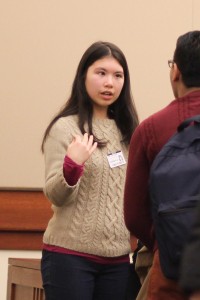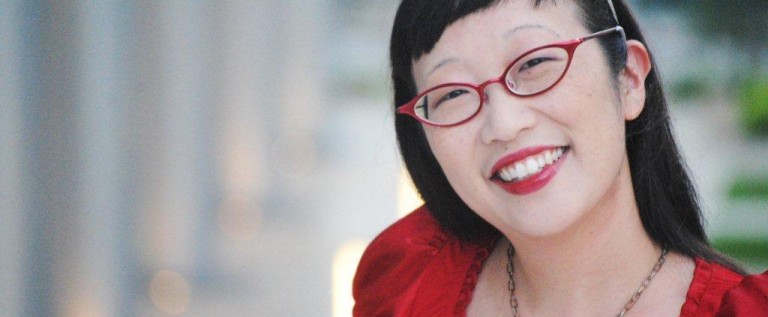Emerging Leader: Adora Svitak By Rachel Kuo and Photos By Jackie Ho

As a literary prodigy, with both prolific reading and writing capability, 16-year-old Adora Svitak has already left an incredible legacy and strives to achieve more. She has already published three books, which include Flying Fingers, a book on learning for aspiring writers that alludes to her own growing love of language, and Dancing Fingers, co-written with her sister Adrianna.
Svitak’s exceptional chronology began at age 3, when she started reading chapter books. By age 7, she wrote over 250,000 words in that year alone, which for comparison is more than twice the number of words in Moby Dick. She has numerous written essays, stories, poems and blogs.
At 12, Svitak spoke at the famed TED Conference, proposing her “big idea” that the world needs to think more childishly, meaning that coming up with solutions to large problems should be bold, optimistic and creative. She later expanded this idea by exploring how creativity extends to classroom learning. At 13, she published her first novel-length book Yang in Disguise, a fictional work exploring heroic responsibility and expectations.
For almost 10 years now, Svitak has promoted literacy to large audiences of students and adults both nationally and abroad. Now, she also has an online literary magazine called Write With Adora, which publishes poems, essays, short stories and creative nonfiction by other young writers.She lives in Redmond, Wash., where she is helping to organize a local TED conference.
A voracious reader, Svitak has a plethora of favorite books, including Little Women, The Hobbit, Jane Eyre and the Chronicles of Narnia. A non-fiction book she recommends is Twilight of the Elites: America After Meritocracy, which inspired the speech she delivered to Yale and Columbia’s School of Education students on merit and testing in education.
“[The book] drastically changed my thinking about what we call ‘merit’ and how we use it to determine who gets the best schooling, best jobs and best lives,” she said.
Also confidently identifying as a feminist, Svitak prefers writing and reading strong female characters to counter the fairly passive roles women often have in children’s storybooks. Her feminist role models include Gloria Steinem, Elizabeth Warren, and writers such as J.K. Rowling. A history buff, she also looks up to leaders from the women’s suffrage movement, such as Elizabeth Cady Stanton and Susan B. Anthony.
“These women gave up so much societal ‘respectability’ and personal safety in the name of women’s rights, so I’m grateful to them,” she said.
Svitak finds inspiration in her peers as well.
“I would love to interview Malala Yousafzai,” she said of the teenage education activist from Pakistan who was shot by the Taliban for saying that all girls should have the chance to go to school. “Her eloquence and passion for promoting education inspire me.”
Svitak has a strong and capable heart when it comes to helping others and sees empathy and humility as important traits for educators and leaders.
“If they don’t know what it’s like to struggle, to not understand, then they may also not understand how to explain things in a different way that makes sense to you,” she said. “Humility is key because you need it to realize that you still have a lot to learn, that the road of learning doesn’t stop when you become a teacher.”
When it comes to creating change, Svitak’s main passion is education reform, and she uses literacy and learning as her starting point for creating change. She recognizes the importance of shaping policy versus drumming up campaign donors and interest groups. “That’s significantly easier said than done, of course,” she conceded.
Svitak sees creative writing as an important component in the education system. Beyond teaching kids basic writing and storytelling skills, creative writing trains them to think differently and more critically.
“It’s like you can feel your brain growing when you force yourself to step out of the box and dream up new worlds,” she said. “Creating algorithms in computer science forces your mind to navigate tricky mazes of logic and mathematical fluency; creating stories where you make up people that have to be relatable and kill your beloved characters and outline plots that make sense forces you to navigate the arguably trickier mazes of empathy, sadism, reason and beauty. In short, it teaches you how to be human.”
While unsure of the stories she wants to write next, Svitak knows, like any good writer, that next steps include reading more. Her current book list includes David Foster Wallace’s Infinite Jest and any and all books by Haruki Murakami.
A fan of pirates since childhood, she added, “I might return to my childhood ‘roots’ of writing escapist fantasy adventures featuring swashbuckling sword-fighters, or maybe I’ll explore some new territory. I know that I want to do National Novel Writing Month this year in November, so hopefully I’ll figure it out by then.”
Svitak will be attending University of California, Berkeley in the coming fall. “I’m super pumped to be a Golden Bear,” she gushed. “College and all the chances it provides for intellectual engagement, new opportunities and fun excites me.”
Her dreams are many — and attainable for someone of her ambition and intellect. Svitak aspires to be a journalist, teacher, historian and talk show host, all the while continuing to promote and build awareness of education and literacy issues.







